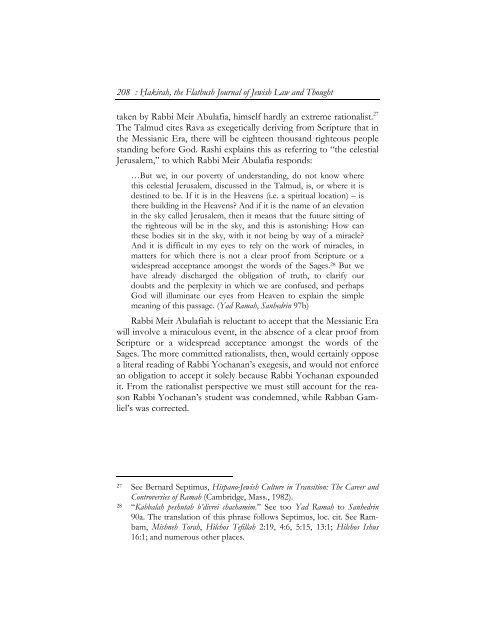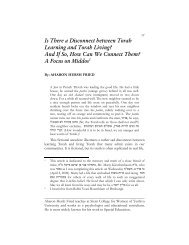Messianic Wonders and Skeptical Rationalists - Hakirah.org
Messianic Wonders and Skeptical Rationalists - Hakirah.org
Messianic Wonders and Skeptical Rationalists - Hakirah.org
Create successful ePaper yourself
Turn your PDF publications into a flip-book with our unique Google optimized e-Paper software.
208 : Hạkirah, the Flatbush Journal of Jewish Law <strong>and</strong> Thought<br />
taken by Rabbi Meir Abulafia, himself hardly an extreme rationalist. 27<br />
The Talmud cites Rava as exegetically deriving from Scripture that in<br />
the <strong>Messianic</strong> Era, there will be eighteen thous<strong>and</strong> righteous people<br />
st<strong>and</strong>ing before God. Rashi explains this as referring to “the celestial<br />
Jerusalem,” to which Rabbi Meir Abulafia responds:<br />
…But we, in our poverty of underst<strong>and</strong>ing, do not know where<br />
this celestial Jerusalem, discussed in the Talmud, is, or where it is<br />
destined to be. If it is in the Heavens (i.e. a spiritual location) – is<br />
there building in the Heavens? And if it is the name of an elevation<br />
in the sky called Jerusalem, then it means that the future sitting of<br />
the righteous will be in the sky, <strong>and</strong> this is astonishing: How can<br />
these bodies sit in the sky, with it not being by way of a miracle?<br />
And it is difficult in my eyes to rely on the work of miracles, in<br />
matters for which there is not a clear proof from Scripture or a<br />
widespread acceptance amongst the words of the Sages. 28 But we<br />
have already discharged the obligation of truth, to clarify our<br />
doubts <strong>and</strong> the perplexity in which we are confused, <strong>and</strong> perhaps<br />
God will illuminate our eyes from Heaven to explain the simple<br />
meaning of this passage. (Yad Ramah, Sanhedrin 97b)<br />
Rabbi Meir Abulafiah is reluctant to accept that the <strong>Messianic</strong> Era<br />
will involve a miraculous event, in the absence of a clear proof from<br />
Scripture or a widespread acceptance amongst the words of the<br />
Sages. The more committed rationalists, then, would certainly oppose<br />
a literal reading of Rabbi Yochanan’s exegesis, <strong>and</strong> would not enforce<br />
an obligation to accept it solely because Rabbi Yochanan expounded<br />
it. From the rationalist perspective we must still account for the reason<br />
Rabbi Yochanan’s student was condemned, while Rabban Gamliel’s<br />
was corrected.<br />
27 See Bernard Septimus, Hispano-Jewish Culture in Transition: The Career <strong>and</strong><br />
Controversies of Ramah (Cambridge, Mass., 1982).<br />
28 “Kabbalah peshutah b’divrei chachamim.” See too Yad Ramah to Sanhedrin<br />
90a. The translation of this phrase follows Septimus, loc. cit. See Rambam,<br />
Mishneh Torah, Hilchos Tefillah 2:19, 4:6, 5:15, 13:1; Hilchos Ishus<br />
16:1; <strong>and</strong> numerous other places.
















